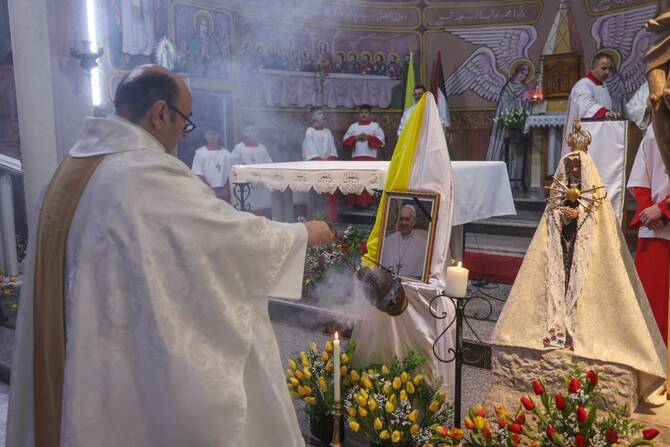LONDON: Christians in the Palestinian territory of the Gaza Strip have told of their heartbreak following the death of Pope Francis, who had called them “every day” during the Israeli conflict that began in late 2023.
Gaza’s Holy Family Church paid tribute to the late pontiff, who passed away on Monday.
Father Gabriel Romanelli, the pastor of the parish, shared details about the pope’s last phone call with the Catholic community, revealing that he called them on Saturday and said: “Thank you … for all that we made here.”
During an interview with Sky News, Romanelli added that the pope had “asked (for) prayer and gave the blessing for all the people, for the Christian community and for all the citizens in Gaza.”
He added that the late pope “was a very humble servant of the Lord.”
Romanelli said: “All the time he told us, for more than a year-and-a-half (of the Israeli war), and he called every day, every day. He asked to help people, to protect the children.”
Pope Francis called for peace in conflict-ridden areas, including the Middle East and Sudan, throughout his 12-year tenure as head of the Catholic Church.
He called for an investigation into whether Israel had committed genocide in Gaza following the attack by Hamas on Israel in October 2023. He also called for an immediate ceasefire in Gaza and the release of Israeli hostages during his final public appearance on Easter Sunday.
He said: “I express my closeness to the sufferings of Christians in Palestine and Israel and to all the Israeli people and the Palestinian people.
“I appeal to the warring parties: call a ceasefire, release the hostages and come to the aid of a starving people that aspires to a future of peace.”
Pope Francis died on Monday at the age of 88 after enduring a severe bout of double pneumonia.
George Antone, the head of the emergency committee at the Holy Family Church in Gaza, told the Vatican News Service: “We lost a saint who taught us every day how to be brave, how to keep patient and stay strong.”
The pope’s nightly phone calls to check on Gaza’s Christian community had become routine during the conflict. He also made it a point to speak to everyone in the room and not just the priest, Antone said.
He added: “We are heartbroken because of the death of Pope Francis, but we know that he is leaving behind a church that cares for us and that knows us by name, every single one of us.
“He used to tell each one: I am with you, don’t be afraid.”
























